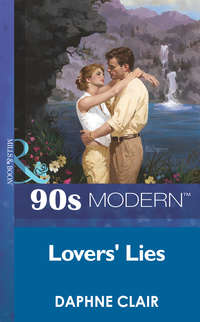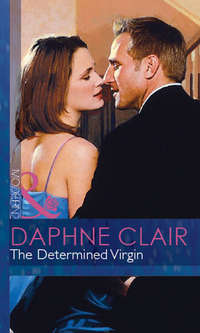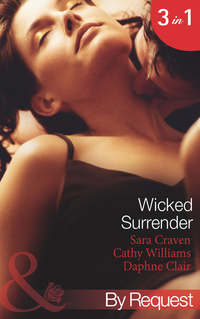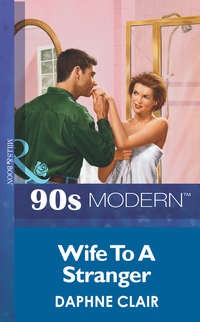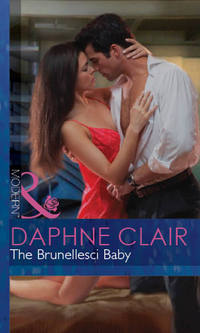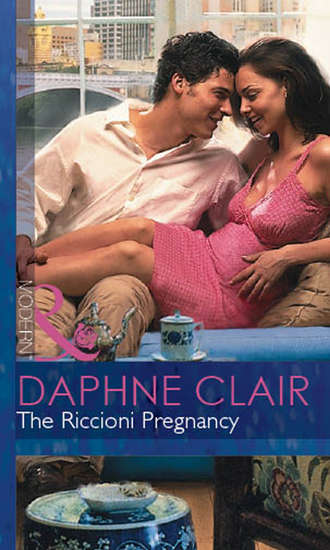
Полная версия
The Riccioni Pregnancy

“I’ll take responsibility for this,” Roxane said.
“We both will.”
Zito looked briefly dangerous. “If you think that I’m going to hand you money and leave you to it,” he said, “think again. You must know this changes everything.”
Her small laugh was slightly hysterical. “You don’t need to tell me that!” Already her life was in the process of turning upside down.
“You can’t be left on your own.”
“I’ve been on my own for over a year! I won’t be the first single mother.”
“You’re not a single mother! This child has a father.” With deceptive quiet, Zito added, “I won’t leave you to fend for yourself while you carry my child.”

Relax and enjoy our fabulous series about couples whose passion results in pregnancies…sometimes unexpected! Of course, the birth of a baby is always a joyful event, and we can guarantee that our characters will become dedicated parents—but what happens in those nine months before?
Share the surprises, emotions, drama and suspense as our parents-to-be come to terms with their new babies. All will discover that the business of making babies brings with it the most special love of all….
Celebrate our new arrival,
The Riccioni Pregnancy
Daphne Clair
The Riccioni Pregnancy
Daphne Clair


Readers are invited to visit Daphne Clair’s Web site at:
http://www.daphneclair.com
Contents
CHAPTER ONE
CHAPTER TWO
CHAPTER THREE
CHAPTER FOUR
CHAPTER FIVE
CHAPTER SIX
CHAPTER SEVEN
CHAPTER EIGHT
CHAPTER NINE
CHAPTER TEN
CHAPTER ELEVEN
CHAPTER TWELVE
CHAPTER ONE
SHE was being followed. Silently, invisibly, but the prickling sensation at her nape and between her shoulder blades gave a primeval warning. Behind her the night hid a hunter.
She had walked down this narrow, sloping street hundreds of times, in daylight and darkness, and never been nervous. Until now.
The street lamps were obscured by trees that lined the narrow verge and cast deep shadows, wayward roots making treacherous humps and cracks underfoot. She should have changed her shoes before leaving work. The heels of her navy courts were high enough to be dangerous in the dark.
She tripped, let out a whispered exclamation, and cast a hurried glance over her shoulder, her heart accelerating.
Nothing. But it would be easy for anyone who didn’t want to be seen to dodge behind a tree or one of the parked vehicles along the street. Few of the houses had room for a garage. They’d been built huddled cosily together before the motor car became a way of life.
Instinct quickened her pace, one hand fumbling for a key in the bag that swung from her shoulder.
At her neighbour’s gate she paused, casting another glance behind her. Was the moving shadow under one of the trees a trick of the faint night breeze stirring the leaves in the inadequate lighting, or…?
Briefly she pictured herself pounding on the door, pleading for entry, saw the cheerful, phlegmatic Tongan family taking her in, sending out their muscular menfolk to deal with the lurking stranger. But no lights showed, no sound of the teenagers’ music videos or the adults’ rich, rapid voices floated into the street.
And what if she was mistaken? Fleeing some phantom attacker who didn’t exist?
Her own gate was only yards away, and the safety of her home, the two-storey cottage that recalled New Zealand’s colonial past.
Don’t run. A few quick strides, a practised fumble with the latch and then she was on the short brick pathway, the gate clanging shut behind her, the drooping leaves of the kowhai brushing the shoulders of her suit as her fingers closed at last on the key in her bag.
She was on the second of the three worn wooden steps to the tiny porch when the gate clanged again, and she whirled, backing up the last step as a tall male figure materialised, closing on her.
One high heel caught in a gap between the worn boards, and she lost her balance, flinging out a hand to steady herself and losing her grip on the key.
She grabbed at a painted post, heard the key clatter to the brick path, saw the dark bulk of the man’s wide shoulders as he stooped and picked it up.
There was no way she could get past him. She was trapped with a locked door behind her. And before her, a man with her key in his hand, already straightening.
She lifted her head, opened her mouth, drawing breath into her lungs ready to scream and hope someone would hear—someone who would help.
He took the steps in one stride, and a large, warm hand clamped over her mouth, strangling the sound at birth.
Smartly, viciously, she lifted her knee, but he was already behind her. She tried to bite, her teeth finding no purchase against the broad, suffocating palm. She kicked backward with a lethal heel but he was obviously prepared for the ploy and she found only empty air. Her elbow, aimed for his solar plexus, was caught in a hard hand that slid to her wrist, then his arm went around her, bringing her against an equally hard masculine body.
Then his breath was in her ear, his voice low, harsh. ‘Darling, don’t.’
Darling? Her whole body went rigid within the iron circle of his arm across her midriff.
Darling? Fury replaced fear.
Her temples throbbed as if her heart were sending all her blood there, and her limbs went hot and boneless. His imprisoning embrace slackened a fraction, and she used the moment to twist away and face him, her right hand swinging up with all her weight behind it, delivering a slap that resounded in the quiet street like a gunshot, the force of it almost rocking him off his feet.
‘Bastard!’ Her voice was shrill and wavering and she wished she’d kept her mouth shut. Now he knew she was panicked, a hysterical woman shrieking futile insults because she’d been frightened out of her mind by a man looming from the night.
His face was invisible in the darkness but she saw him lift a hand, and in a blind, useless attempt at avoidance she retreated the few inches that were left to her before her back collided with the locked door.
And then he laughed.
She heaved air into her lungs. Her head was buzzing and she seemed to be floating somewhere in space—dark, disorienting space. She had to take another breath before she could speak. Gritting her teeth, making her voice hard and steady, she said, ‘Give me my key.’
He held it out to her, waiting for her to take it.
She snatched at it, but for a fraught moment he didn’t release it, and her fingers were touching his.
Adrenalin raced from her fingertips and through her body, making it weightless, every nerve humming with electricity. Then he relinquished the key and she whirled and tried to fit it into the lock, unable to find the tiny slot because she was shaking so badly.
Strong male fingers closed over hers, and she jumped, then he was taking the key, efficiently inserting it, turning it, his hand on her back as he opened the door and thrust her ahead of him.
Now they were both inside and he’d shut them into a deeper darkness, together. Her eyes useless, her other senses at screaming pitch, she could hear the faint sound of his strangely uneven breathing, smell clean cotton and wool, soap and a hint of something woodsy—and underneath it the long-unfamiliar, earthy and shockingly seductive scent of male arousal.
His hand was still at her waist, and his arm came further about her, pulling her to him. ‘You’re trembling,’ he said. Her temple was grazed by the subtle rasp of a shaven chin. ‘I’m sorry.’
‘So you bloody should be!’ Anger was a defence against shame and confusion. She wrenched away from him, reached blindly for the light switch and blinked in the sudden cruel glare at watchful burnt-sienna eyes, black brows drawn together in a frown above a masterful nose, and a mouth fixed in a taut line that failed to hide its sensuous masculinity.
His eyelids lowered as he studied her face in return. ‘You’re pale,’ he told her.
She felt pale. ‘Have you been stalking me?’ she demanded.
The upward jerk of his head dislodged a strand from the severely combed sleekness of salon-styled night-black hair. ‘Stalking?’
‘You were following me. Don’t tell me you weren’t trying to hide.’
‘I was trying not to frighten you.’
She almost laughed. ‘You what?’
‘I thought if you saw—or heard—a man behind you in this lonely street you’d have reason to feel afraid.’
‘So what the hell did you think I’d feel, knowing someone was there and deliberately keeping out of sight?’ Agitatedly she slipped the bag from her shoulder, dumping it next to the phone on the half-round table near the door.
‘I didn’t think you knew.’
He reached out and took her hand, placing the key into the palm and closing the fingers over it. And then he bent his head and pressed his lips briefly to the fine skin of her inner wrist, sending the pulse wild and making her tremble even more.
Immediately he lifted his head, and even as she tried to tug away he scanned her face again, his eyes far too prescient. ‘You need a drink,’ he said.
He looked about them and saw the door to her living room behind him, the furniture dimly discernible. Before she knew it he was drawing her into the room, switching on the light. She made another effort to pull away but he took no notice. ‘Sit down,’ he ordered, guiding her to the couch set at right angles to the small fireplace, with a solid, beautifully-grained pale rimu coffee table before it.
She sat down because she still felt as if her bones had deserted her. ‘I don’t need a drink, and if I did I’m quite capable of getting it myself.’
His withering look said he didn’t believe either claim. He swept a hawkish gaze about the room, and went to the glass-doored corner cabinet where a half dozen bottles occupied one shelf and a neat array of tumblers and goblets another.
Knowing he would ignore any further protest, she tightened her lips and waited until he came back with amber liquid in a squat crystal tumbler and handed it to her.
She gulped half of the brandy, making her throat burn, and her eyes water so that involuntarily she closed them.
The seat cushions beside her depressed, and she opened her eyes and stiffly turned her head.
One long arm resting on the back of the couch, he watched colour burn into her cheeks. The brandy, she told herself. She wished he wouldn’t sit so close—his thigh, encased in well-pressed dark pants that matched his superbly cut jacket, almost touching hers where the skirt of her lightweight suit bared her knees.
‘Drink it all,’ he said.
She should tell him to go to hell, that she didn’t want him or any man pushing uninvited into her home, ordering her about and deciding what she needed. It wasn’t hard to guess what he thought she needed…
Lifting the tumbler, she emptied it. Dutch courage. Her hand stayed clenched about the cool, delicate glass; a wonder that it didn’t break.
He said, ‘Do you live alone here?’
‘That’s none of your business.’ The answer snapped out before she’d thought.
Damn. Why hadn’t she claimed a boyfriend—a big, burly, protective boyfriend? Or a half dozen flat-mates, due home at any moment. Although the cottage wasn’t big enough for that many, with only two bedrooms. ‘How long have you been following me?’ she asked.
‘I saw you get off the bus in Ponsonby Road. Do you often walk home alone in the dark?’ He sounded condemnatory.
Ponsonby Road was popular for its eclectic mix of businesses, where homesick Pacific Island immigrants could buy taro and yams, pawpaw and bread-fruit, and Fijian Indian women their jewel-coloured saris in tiny, crammed shops cheek by jowl with airy galleries of trendy local and imported art. But the long, busy road was best known for its restaurants and sidewalk cafés. Crowded and well lit, it was only a few hundred yards uphill from the cottage.
She said, ‘I’ve always been perfectly safe until tonight.’
‘You were safe tonight. I made sure of that.’
‘Thank you for your concern,’ not concealing her sarcasm, ‘but it was unnecessary.’
‘Once I had seen you it was totally necessary,’ he contradicted her. ‘Do you mind if I pour myself a drink?’
‘Yes. I do mind.’
Black brows silently rose. The slightest flicker of his eyelids conveyed displeasure. ‘So rude?’
Stupidly, she felt reproved. As if he had a right to scold her for bad manners.
He looked at her for a moment or two, then without haste rose and went back to the cabinet, where with some deliberation he poured vodka into another glass. ‘Anything more for you?’ he inquired with equally deliberate courtesy.
Seethingly silent, she shook her head, and he returned to her side.
Damn him, he knew she couldn’t bodily throw him out. He was establishing his physical superiority, claiming territory. But this was her territory, and he was an intruder.
Looking down at the vodka without drinking, he said softly, ‘You surely don’t expect me to walk away now?’
If only. But she owed it to herself to try. ‘Would you,’ she inquired baldly, ‘if I asked you to?’
He was still staring into the depths of his glass. The liquid didn’t move—his hands were perfectly steady. Unlike hers. Her whole body was racked with tiny, invisible tremors. It was a moment before he said, ‘Are you asking?’
She stopped breathing. She was sure she could hear her heart beating, slow and heavy, and her throat was locked.
Say it. ‘Yes.’
She’d said it, not as decisively as she’d have liked to, but clearly enough, even if her voice was low in her throat.
Seconds ticked by. Then he lifted the glass and swallowed, lowered it again, holding it in both hands. He turned his head and she received the full force of the ferocious blaze in his eyes, so that she recoiled, her lower lip briefly caught in her teeth.
‘No,’ he said.
She shot to her feet, then halted because the sudden movement had made her a little dizzy—the damned brandy again—and besides, where was there to run to? He could corner her easily before she’d taken half a dozen steps.
As if to confirm it, he downed the remainder of his drink and stood up too, leaving the glass on the carpet by the couch. ‘No,’ he repeated. ‘You can’t run from me any more, Roxane.’
CHAPTER TWO
‘I’M NOT running.’ It made her sound as if she’d fled without thought, in blind fear. The room tilted, and she hastily sat down again. ‘I’ve never run from you.’
‘What would you call it, then?’ he demanded.
‘It was a decision. A rational, sensible decision.’
His lip curled. ‘Rational? Sensible?’
A sensation sickening in its familiarity washed over Roxane. Helplessness, despair, and mingled with it a deep, inexpressible longing. ‘You don’t think I’m capable of that. But it was the best decision of my life.’
His jaw tightened and a small muscle in his cheek kicked almost invisibly. The anger that still smouldered in his eyes turned bleak before thick black lashes hid them. ‘Was it necessary,’ he asked bitingly, ‘to be so dramatic—cutting off all contact, swearing your parents to secrecy, making me communicate through your lawyer as if I were some brute who had beaten you?’
‘I told him you hadn’t,’ she said swiftly, looking down at her hands, wound tightly into each other. The solicitor had jumped to obvious conclusions, and she’d made sure he didn’t retain them. ‘You’re not a brute, Zito.’
‘God—’ he breathed the word as if it rasped his throat ‘—I thought I’d never hear you say my name again.’
Roxane winced, thankful that her head was still bent and he couldn’t see her face, shadowed by the shoulder-length sable fall of her hair. But the change in his voice forced her to look up, her clear green eyes wondering.
To find his expression rigid and unreadable, his gaze cool, almost indifferent. ‘Did it occur to you that if I wanted you back I could have found you?’
‘I know you could have.’ She tried to ignore the gibe in his caveat, if I wanted you… Zito could afford to pay any number of private detectives, for as long as it took.
‘You’d made it clear you didn’t want to be found.’ He paused, a corner of his mouth curving satirically. ‘Or were you hoping that I’d somehow do it anyway and come running after you, begging you to return to me?’
Sometimes, weakly, she had fantasised that he would track her down regardless of her efforts, that he’d come to her with apologies and promises and a new understanding—a changed and humbled man, and everything would miraculously be all right. There had been long cold nights when the fantasy had helped her through to another dawn.
But it would be fatal to admit it. ‘No!’
She thought she saw a brief flare of some emotion—frustration? disappointment?—before he resumed the guarded watchfulness he’d shown earlier. She must have been mistaken, falling prey to all-too-familiar wishful thinking. ‘I’m glad you didn’t,’ she said.
He swung away from her, pushing back the jacket of the perfectly tailored suit by shoving his hands into the pockets of his trousers.
Zito’s clothes had always been impeccable, discreetly expensive but worn with an insouciance that made them part of the man, not any kind of status symbol to impress others.
Now he was inspecting the walls that she’d painted palest jade green and hung with cheap reproduced art, along with a couple of originals by local unknowns.
His gaze next disdained the calico covers hiding the shabbiness of her comfortable secondhand couch and the mismatched armchairs facing it across the low table that bore the honourable scars of a chequered life. For a few seconds his attention was caught by the worn, silky antique rug that Roxane had spent too much on but loved all the more for it.
He swept another sharp-eyed glance about the room, before he turned to her.
Roxane asked defiantly, ‘Don’t you like it?’
He didn’t answer immediately, and when he did his voice was expressionless. ‘It’s very attractive. Small but…cosy.’
‘I like small.’
For a moment the wicked, teasing sexual humour that had attracted and excited and confounded her when they first met gleamed in his eyes, lifting one eyebrow and a corner of his mouth in subtle disbelief. And damn, she responded to it as always, with a frightening mix of inward laughter and sheer wanton, bone-melting desire.
Keeping her expression blank, she hoped her eyes wouldn’t betray her.
The laughter died and his mouth went hard. To her considerable surprise, he looked away first. ‘Is the house yours?’ he asked, almost as if it were a random question plucked from the air.
‘Mine and the bank’s.’
Her stock answer, but she should have expected the sudden stabbing quality of his stare. ‘If you needed money you could have asked me. Through your lawyer if necessary. I told him—’
‘I don’t want your money. I have a good job and I can afford the mortgage.’
‘Mortgage!’
He made it sound like a dirty word. Roxane smiled thinly. ‘It’s what we little people have when we need to buy a house.’
‘You have no need to buy a house. I can give you anything you need—hell, I did give you everything!’
‘Not everything,’ she said softly, sadly. Not the one thing she needed above all.
Furious, he said, ‘I loved you!’
She wouldn’t even think about what that past tense meant. ‘I know. I know you did. In your own way.’
He thrust a hand savagely over his hair, the frown turning to a scowl. ‘I gave you my heart and my soul, everything that was in me. I don’t know any other way.’
Of course he didn’t. Maurizio Riccioni never had done a thing in his life except in his own inimitable, confident, and usually hugely successful way. Why should he have ever imagined that his marriage, his wife, might not succumb to that combination of self-assured charm and incisive decision-making?
Almost compassionately she said, ‘It wasn’t all your fault. I was too young, and I should have said no when you asked me to marry you.’
‘You did,’ he reminded her.
Yes, she had, the first time he asked her, showing a shred of common sense. But her opposition hadn’t lasted long. She’d soon had her fears and scruples overturned one by one under the onslaught of Zito’s clever brain, unswerving will, and devastating kisses. He had even talked her parents round, despite their misgivings about their only daughter marrying at nineteen.
He’d reluctantly waited until she turned twenty, and on her birthday she’d stood beside him while they exchanged their solemn vows in the cathedral in Melbourne, with all the trimmings and before several hundred guests.
But marriage was more than a frothy white dress and a champagne reception. And theirs hadn’t stood the test.
‘I should have stuck to my refusal,’ she admitted.
‘Thank you.’ His voice held an acrid note. ‘Sometimes I wish I had beaten you.’
‘Zito!’
He managed to look both shame-faced and impatient. ‘You know I’d never hurt you, or any woman! But it would give me a reason for your desertion—something that made sense.’
He started prowling round the room again, stopping at the small desk that she’d found in one of the few remaining Ponsonby junk shops that didn’t have pretensions to being an antique store. When she’d sanded and polished it the grain of the timber had come up nicely.
Zito took a hand from his pocket and idly shifted aside a ‘personal invitation’ to subscribe to a book club at a ‘once-only’ price, revealing the envelope underneath.
‘Those are private!’ Not that she had anything in particular to hide. There was only more junk mail, bills and a letter from a cousin in England.
He looked at her unseeingly, his finger stilled on the sheet of paper, then lifted his hand, looking down again. Finally he turned fully. ‘Ms Roxane Fabian?’
Why did she feel guilty? Roxane shrugged.
‘You told me you were happy to take my name,’ he said, his voice thickening, ‘when we got married.’
‘I didn’t mind…it was no big deal.’
‘It was to me. A very big deal.’
Just as reverting to her maiden name had become important for her. She supposed it was symbolic. ‘An ownership thing?’ she accused, trying for mild amusement.
He controlled his temper, covering it with a hard laugh. ‘If you thought that, then you were too young.’
Or too stupid, his tone implied. ‘You didn’t think so…then.’
His reaction was barely noticeable, but Roxane was so attuned to his every tiny movement she saw the stiffening of his muscles, the infinitesimal recoil. She’d pierced the armour of his self-confidence, however minutely.
The elation she felt disconcerted her. She had never deliberately set out to wound Zito. Of course she’d known he would be upset and angry when she left him, but she’d had no thought of revenge or punishment, only a dire need for self-preservation.
In her long and probably incoherent farewell letter she had assured him that she didn’t hate him, and he shouldn’t blame himself for what he couldn’t help. She had tried not to hurt him any more than the simple fact of her departure inevitably would.


